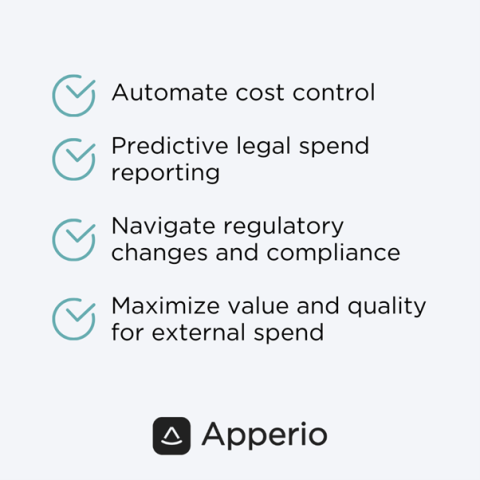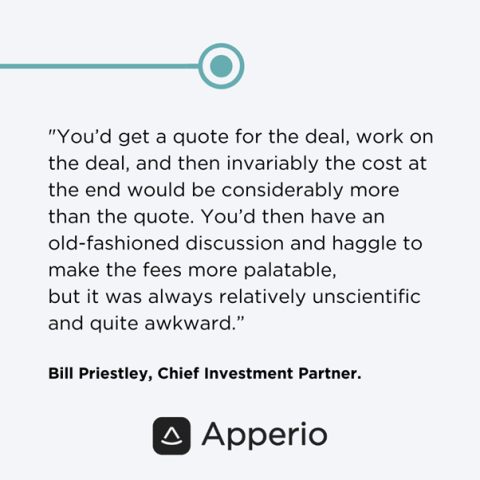2024: What's next for private equity legal spend management

Legal and advisory expenses are fast becoming one of the largest outlays for private equity firms— often being one of the top two expenses. In response, recent years have witnessed a heightened focus on mastering this substantial expense. In fact, 57% say controlling costs is a top priority.
With cost saving more of a focus, private equity legal spend management practice has expanded swiftly as legal and finance departments search for better ways to plan, predict, and scrutinize their legal expenses to get a handle on costs. And even forecast future spend. 🔮
Could this be the pivotal year when firms finally gain confidence in managing legal spend? We think so. This blog sets out to unravel the trends and best practices set to optimise legal spend management in 2024. Let’s jump in. 👇
Quick overview: The legacy problem with legal spend management
Managing legal spend has always been tricky for private equity firms. Traditionally, legal expenses are managed through a combination of departments—including in-house counsel, deal teams and finance—as well as external legal partnerships.
However, the management of these legal fees presents a series of challenges. Collaboration issues aside, there’s also the unpredictable nature of legal work and traditional e-billing practices.
Unpredictable billing
Legal work for private equity firms can be unpredictable, which leads to challenges when setting and managing budgets. The truth is private equity firms never really know what the final bill will be—often until the invoice actually lands. This makes forecasting a nightmare and actual costs often end up way higher than expected.
Fragmented systems
On top of that, private equity firms usually track legal bills across fragmented systems and spreadsheets. A manual approach to accrual tracking and analysis is often to blame for inefficiencies and a lack of real-time visibility into spending patterns. This fragmented approach not only takes up valuable time, but also increases the risk of cost overruns and missed opportunities for finding more value.
Global regulations
In addition, frequent cross-border transactions and regulatory changes add another layer of complexity to legal spend management. Each jurisdiction brings different laws, regulations, and costs. All of which makes it tough to keep up with compliance and billing intricacies across many regions.
🔎Ultimately, keeping a close eye on these costs is much harder than it should be.
So, while private equity firms have some processes in place to oversee legal spend, they're struggling with transparency, predictability and efficiency. It's clear that more innovative solutions are needed to truly optimize legal cost management in private equity. Monitoring bills can't remain manual and inefficient.
Top trends shaping private equity legal spend management in 2024
With the majority (73%) of private equity firms saying legal fees have increased significantly over the last three years, managing legal spend has become a key priority for private equity firms. Adopting a data-centric strategy, firms are leveraging legal spend analytics tools to eliminate manual tasks, enhance visibility into total spend liabilities, and ensure quality. They also identify other value levers—like maximising the value of your panel agreements.
The objectives are clear: enhance transparency, control costs, and remain in compliance with the touch and ever-changing regulatory environment. So, what exactly are leading private equity firms doing differently? Let’s look at what’s key for 2024, and best practices…
#1. Automate cost control
How private equity firms oversee and control legal expenses is getting a major upgrade, thanks to new technology solutions. Using advanced legal technology, like cloud-based platforms and smart software, private equity firms are automating processes that were once manual and time-consuming. This allows for more streamlined invoice processing, budget tracking, and vendor management.
The result? Visibility of costs, reducing unexpected overspend, and ensuring maximum value from your advisors.
#2. Predictive legal spend reporting
Some advanced legal spend management software goes beyond automating manual tasks. The right tech allows firms to analyze vast amounts of data to detect patterns and anomalies in legal spend—and predict future costs. This data-driven forecasting ability enables informed budgeting decisions, negotiates better rates, and allows firms to allocate legal spend more strategically.
The result? Private equity firms can optimize legal budgets and control costs like never before.
#3. Navigate regulatory changes and compliance
Staying ahead of the ever-changing and increasing regulatory environment poses a significant challenge for legal and compliance departments operating at full capacity. This calls for compliance automation to stay agile. Savvy private equity firms are adopting next-generation tools and approaches to implement new "shields" for compliance.
The result? Reducing compliance risk, manual efforts, and speed to compliance. Automation handles the tedious work so legal teams can focus on high-value strategic initiatives.
#4. Maximize value and quality for external spend
Private equity firms can get more value from the money they spend on outside services by being smart about who they choose to work with, setting clear expectations with law firms, and using the right tech to make managing costs easier.
Agreeing fee estimates with law firms, and then monitoring closely as the matter progresses helps to reduce friction, and ensure that there are no surprises when the invoice lands. Plus, it helps to manage quality.
The result? Private equity firms can make sure their money is well spent, not just saving cash but also adding real value to their business.

Strategies for private equity legal spend management optimization in 2024
To say that legal spend management is challenging is a massive understatement. The good news is that the challenges can be overcome by implementing the right strategies.
With that in mind, here are several best practices to help you gain control and confidence in legal spend management:
Leverage smart software
With so much at stake, you need data-driven insights, not guesswork. That’s where comprehensive legal spend management software comes in. It provides complete visibility into every aspect of legal spending.
💡Top tip: Look for systems that seamlessly integrate with your existing financial systems and provide real-time analytics.
Centralize spend intelligence
Create a single source of truth by consolidating legal spend data from across departments, outside counsel, and regions. Solutions that provide visual dashboards enable you to see at-a-glance how legal spend is being managed. This new approach allows for better collaboration and makes analysis and cost optimization much easier.
💡 Top tip: Look for tools that can assess performance against your own historical data and industry benchmarks.
Implement data-driven decision-making
Leverage analytics to uncover spending trends, pinpoint savings opportunities, and arm yourself with key insights before negotiating with law firms. This means that your legal and finance teams can make smarter, more informed decisions.
💡Top tip: Invest in analytics platforms that offer predictive modeling capabilities. These can forecast future spend scenarios based on current data and trends, enabling proactive budgeting and spend management.
To put all this into perspective, let’s now look at a real-world example…
Case study: Private equity legal spend management simplified
Epiris invests in UK businesses with an enterprise value of between £75m - £500m. Frustrated in the past by a lack of clarity and understanding over what the firm would be paying for in legal fees, Epiris’s Chief Investment Partner sought a solution.

With legal fees ranging from between £500,000 to £1m per transaction, Epiris needed a better way to manage costs much more proactively.
Epiris began using Apperio in 2018 and has found this to be a crucial tool in helping internal investment and finance teams to understand legal spend in greater detail and manage the external matters currently in progress.
📘Read the full case study here.
The future of private equity legal spend management
It’s clear that 2024 will be a critical year for private equity legal spend management. With legal fees being a top expense, firms are pushed to find better ways to control these costs.
The path forward is now clear. New technology, strong law firm partnerships, and data-driven decisions will transform how firms manage spend.
Key strategies include:
- Using smart software to centralize monitoring of legal spend
- Making budget choices based on data analytics
- Working closely with law firms on value-based billing
These moves promise more visibility and control over legal spend. Examples like Epiris show the real impact of tech-enabled proactive cost management.
Armed with the right tools, strategies, and insights, private equity firms are well-positioned to turn legal spend management from a challenge into a competitive advantage.
Looking to gain control of legal spend management? See how Apperio’s platform creates one single view of legal spend. Book a live demo here.
Keen to learn more first? Read these customer stories.